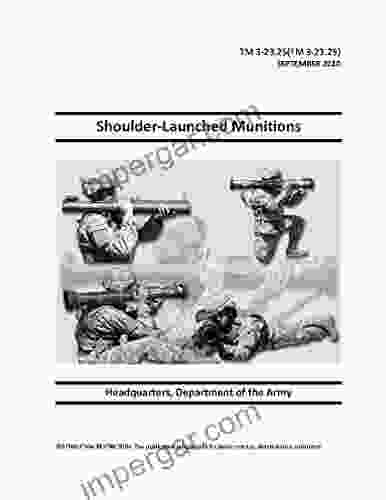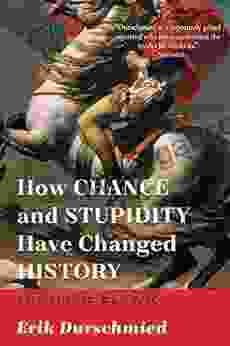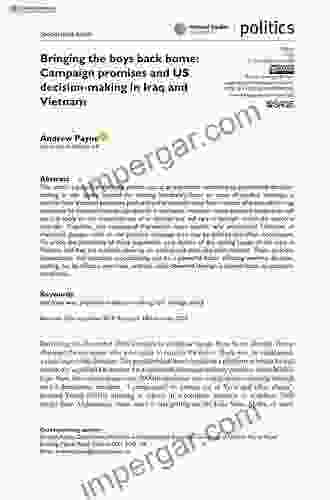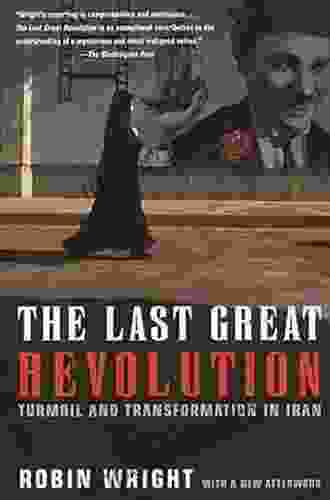Presidential Decision Making and Blame Avoidance in Vietnam and Iraq: A Comparative Examination of Political Leadership

4 out of 5
| Language | : | English |
| File size | : | 2334 KB |
| Text-to-Speech | : | Enabled |
| Screen Reader | : | Supported |
| Enhanced typesetting | : | Enabled |
| Word Wise | : | Enabled |
| Print length | : | 284 pages |
The decisions made by presidents in times of war have a profound impact on the lives of millions of people. The United States' involvement in the Vietnam and Iraq wars provides two striking examples of the challenges and consequences of presidential decision-making in the context of war. In both cases, the decisions made by presidents were highly controversial and led to significant loss of life and suffering.
This article examines the decision-making processes of presidents Lyndon B. Johnson and George W. Bush in the Vietnam and Iraq wars, respectively. It explores the factors that influenced their decisions, the ways in which they sought to avoid blame for the consequences of their actions, and the implications of their decisions for the future of American foreign policy.
Decision-Making in the Vietnam War
President Johnson's decision to escalate the U.S. involvement in the Vietnam War was a complex one, influenced by a variety of factors. These factors included the Cold War rivalry with the Soviet Union, the domino theory, and the belief that the United States had a moral obligation to support South Vietnam.
Johnson was also influenced by his own personal ambition and his desire to avoid being seen as weak on communism. He believed that if he did not escalate the war, he would be seen as a failure and the United States would lose its credibility as a world leader.
In Free Download to avoid blame for the consequences of his decision, Johnson employed a variety of strategies. He blamed the North Vietnamese for the escalation of the war and he claimed that the United States was fighting for a just cause. He also used the media to create a favorable image of the war and he censored information that might have damaged public support for the war.
However, Johnson's efforts to avoid blame were ultimately unsuccessful. The war became increasingly unpopular as the body count mounted and the United States suffered a series of military setbacks. Johnson eventually lost the support of the American people and he was forced to resign from office in 1968.
Decision-Making in the Iraq War
President Bush's decision to invade Iraq in 2003 was also a complex one, influenced by a variety of factors. These factors included the 9/11 terrorist attacks, the belief that Iraq possessed weapons of mass destruction, and the desire to remove Saddam Hussein from power.
Bush was also influenced by his own personal ambition and his desire to be seen as a strong leader. He believed that invading Iraq would make the United States safer from terrorism and that it would also spread democracy in the Middle East.
In Free Download to avoid blame for the consequences of his decision, Bush employed a variety of strategies. He blamed Saddam Hussein for the 9/11 attacks and he claimed that Iraq possessed weapons of mass destruction. He also used the media to create a favorable image of the war and he censored information that might have damaged public support for the war.
However, Bush's efforts to avoid blame were ultimately unsuccessful. The war became increasingly unpopular as the body count mounted and the United States suffered a series of military setbacks. Bush eventually lost the support of the American people and he was defeated in the 2008 presidential election.
The decisions made by presidents Lyndon B. Johnson and George W. Bush in the Vietnam and Iraq wars, respectively, provide valuable insights into the complexities of presidential decision-making and blame avoidance. Both presidents were influenced by a variety of factors, including the Cold War rivalry, the domino theory, and their own personal ambitions.
Both presidents also employed a variety of strategies to avoid blame for the consequences of their decisions. These strategies included blaming others, claiming that the war was necessary, and using the media to create a favorable image of the war.
However, the efforts of both presidents to avoid blame were ultimately unsuccessful. The wars became increasingly unpopular as the body count mounted and the United States suffered a series of military setbacks. Both presidents eventually lost the support of the American people and they were both defeated in their respective presidential elections.
The lessons learned from the Vietnam and Iraq wars are important for future presidents to consider. These lessons include the importance of making decisions based on sound intelligence, the need to be honest with the American people about the risks and costs of war, and the importance of avoiding blame avoidance strategies.
By learning from the mistakes of the past, future presidents can make better decisions about war and peace.
4 out of 5
| Language | : | English |
| File size | : | 2334 KB |
| Text-to-Speech | : | Enabled |
| Screen Reader | : | Supported |
| Enhanced typesetting | : | Enabled |
| Word Wise | : | Enabled |
| Print length | : | 284 pages |
Do you want to contribute by writing guest posts on this blog?
Please contact us and send us a resume of previous articles that you have written.
 Book
Book Novel
Novel Page
Page Chapter
Chapter Text
Text Story
Story Genre
Genre Reader
Reader Library
Library Paperback
Paperback E-book
E-book Magazine
Magazine Newspaper
Newspaper Paragraph
Paragraph Sentence
Sentence Bookmark
Bookmark Shelf
Shelf Glossary
Glossary Bibliography
Bibliography Foreword
Foreword Preface
Preface Synopsis
Synopsis Annotation
Annotation Footnote
Footnote Manuscript
Manuscript Scroll
Scroll Codex
Codex Tome
Tome Bestseller
Bestseller Classics
Classics Library card
Library card Narrative
Narrative Biography
Biography Autobiography
Autobiography Memoir
Memoir Reference
Reference Encyclopedia
Encyclopedia Rhonda Abrams
Rhonda Abrams Terry Martin
Terry Martin Siddhartha Manuel Finner
Siddhartha Manuel Finner John Glatt
John Glatt Tom Bower
Tom Bower T W Doane
T W Doane The Washington Post
The Washington Post Elise Garibaldi
Elise Garibaldi Yelizaveta Orlova
Yelizaveta Orlova Tim Ingold
Tim Ingold Victor Ray
Victor Ray Susan Long Dineen
Susan Long Dineen Tim Davis
Tim Davis Peter Thonemann
Peter Thonemann Michael Pollan
Michael Pollan Ziva Solay
Ziva Solay Jh Simon
Jh Simon Anne Gracie
Anne Gracie Sophie Hill
Sophie Hill Jean Ingelow
Jean Ingelow
Light bulbAdvertise smarter! Our strategic ad space ensures maximum exposure. Reserve your spot today!

 Bryce FosterPetroleum Accumulation Zones On Continental Margins: Unraveling the Secrets...
Bryce FosterPetroleum Accumulation Zones On Continental Margins: Unraveling the Secrets...
 Isaias BlairEnglish Translation of Sahir Ludhianvi's Popular Urdu Couplets: A Treasury of...
Isaias BlairEnglish Translation of Sahir Ludhianvi's Popular Urdu Couplets: A Treasury of... Ibrahim BlairFollow ·12.6k
Ibrahim BlairFollow ·12.6k Jack ButlerFollow ·8.7k
Jack ButlerFollow ·8.7k Adrian WardFollow ·13.3k
Adrian WardFollow ·13.3k Dan BellFollow ·7.6k
Dan BellFollow ·7.6k E.E. CummingsFollow ·9.9k
E.E. CummingsFollow ·9.9k Ernest ClineFollow ·7.8k
Ernest ClineFollow ·7.8k Colin FosterFollow ·19.4k
Colin FosterFollow ·19.4k Jason ReedFollow ·17.2k
Jason ReedFollow ·17.2k

 Everett Bell
Everett Bell12 Horrific American Serial Killers: A Spine-Chilling...
Immerse yourself in the darkest recesses of...

 Ross Nelson
Ross NelsonDiscover the Enchanting World of "All That Love...
Prepare to embark on an...

 Cooper Bell
Cooper BellUnveiling the Secrets of Shoulder-Launched Munitions: The...
: Unlocking the World of Shoulder-Launched...

 Boris Pasternak
Boris PasternakHow Chance and Stupidity Have Changed History: A...
Prepare yourself for...
4 out of 5
| Language | : | English |
| File size | : | 2334 KB |
| Text-to-Speech | : | Enabled |
| Screen Reader | : | Supported |
| Enhanced typesetting | : | Enabled |
| Word Wise | : | Enabled |
| Print length | : | 284 pages |












